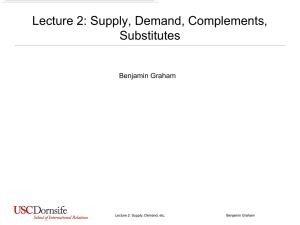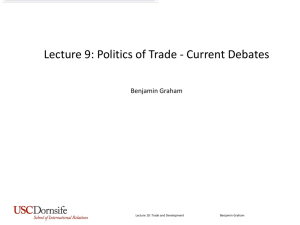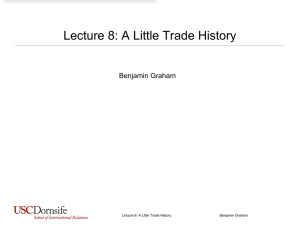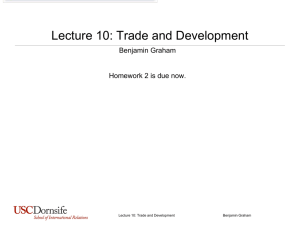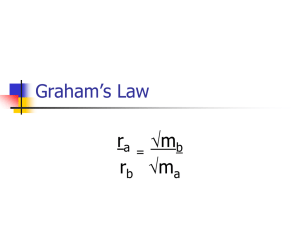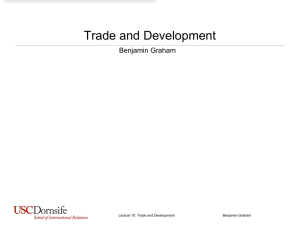Lecture 2: Supply, Demand, Complements, Substitutes
advertisement
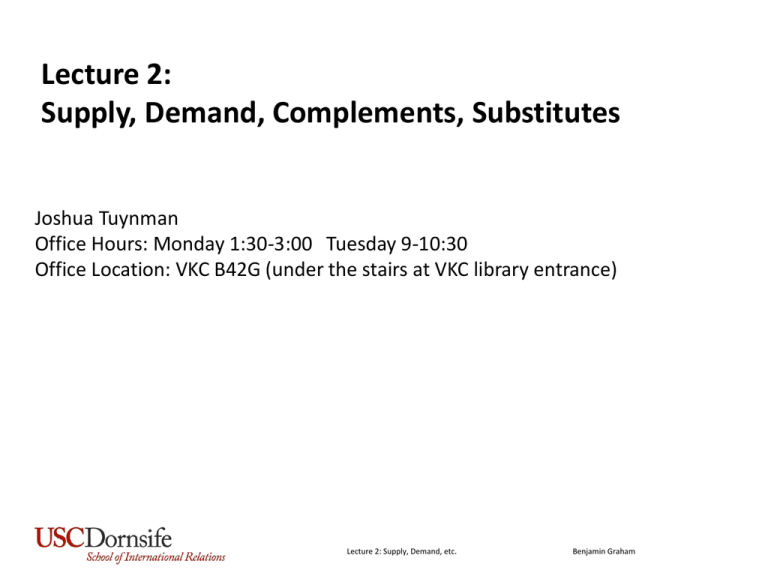
Lecture 2: Supply, Demand, Complements, Substitutes Joshua Tuynman Office Hours: Monday 1:30-3:00 Tuesday 9-10:30 Office Location: VKC B42G (under the stairs at VKC library entrance) Lecture 2: Supply, Demand, etc. Benjamin Graham Today’s Plan • Supply and Demand • Complements and Substitutes Lecture 2: Supply, Demand, etc. Benjamin Graham Housekeeping • Buy the 13th edition • Buy and register your clicker • Syllabus – Homework 1 now due Weds (Sept. 1 • Office Hours for Josh – Monday 1:30-3:00, Tuesday 9-10:30 – VKC B42G (under the stairs at VKC library entrance) Lecture 2: Supply, Demand, etc. Benjamin Graham Mock Reading Quiz • Peanut butter and jelly are: – A. Complementary Goods – B. Substitutes – C. Superior Goods – D. Partner Goods – E. Welfare-maximizing Goods Lecture 2: Supply, Demand, etc. Benjamin Graham Why we’re starting with supply and demand • As bedrock as bedrock gets • We usually talk about goods – S&D also explains prices for labor (i.e. wages) – It even explains the value of currencies Lecture 2: Supply, Demand, etc. Benjamin Graham Demand (individual) Lecture 2: Supply, Demand, etc. Benjamin Graham Demand (market) Lecture 2: Supply, Demand, etc. Benjamin Graham Market Demand For Sodas at Coachella $16 $14 $12 $10 $8 $6 $4 $2 $- 100,000 200,000 300,000 400,000 500,000 600,000 700,000 Lecture 2: Supply, Demand, etc. Benjamin Graham Demand vs. Quantity Demanded Lecture 2: Supply, Demand, etc. Benjamin Graham Demand vs. Quantity Demanded Changes in the price of oil cause the demand curve for oil to shift … … whereas changes in the fuel efficiency of cars cause a movement along the demand curve for oil. A. True B. False Lecture 2: Supply, Demand, etc. Benjamin Graham Quick Question What affects the demand for oil? Lecture 2: Supply, Demand, etc. Benjamin Graham Supply (individual) Lecture 2: Supply, Demand, etc. Benjamin Graham Supply (market) Lecture 2: Supply, Demand, etc. Benjamin Graham Supply of oil What affects the supply of oil? Let’s think through what happens with changes in price. Oil is at a much higher price now than it was twenty years ago. In what specific ways has that affected the way oil is produced? What does the change in oil production mean for the future of oil prices? Lecture 2: Supply, Demand, etc. Benjamin Graham Question If the price of oil went up, what would happen? A. The supply curve would shift right B. The supply curve would shift left C. The quantity supplied would increase D. The quantity supplied would decrease E. A&C F. B & D Lecture 2: Supply, Demand, etc. Benjamin Graham Supply Meets Demand Lecture 2: Supply, Demand, etc. Benjamin Graham Markets Not in Equilibrium Lecture 2: Supply, Demand, etc. Benjamin Graham What Creates Surpluses and Shortages? • In 1973, OPEC enacted an oil embargo. The shortage in supply caused the price of a barrel of oil to rise from $3 to $12. This (with an intermediate step) led to a gasoline shortage in the US. • What U.S. policy caused the gasoline shortage? • What would have happened if that policy had not been in place? Write down what would have happened to supply, demand, quantity supplied, and quantity demanded. Lecture 2: Supply, Demand, etc. Benjamin Graham A Demand Shock When Supply and Demand Both Move Normal Goods vs. Inferior Goods • Normal good: higher income, higher quantity demanded • Inferior Good: higher income, lower quantity demanded • Let’s brainstorm a few of each Lecture 2: Supply, Demand, etc. Benjamin Graham Complements and Substitutes • Two goods are complements if the consumption of one item increases the demand for the other – Hot dogs and hot dog buns • Two goods are substitutes if the consumption of one item decreases the demand for the other. – Buses and trains Lecture 2: Supply, Demand, etc. Benjamin Graham Clicker Question • Right now the price of a gram of cocaine in the US is lower than it was in the 1970s (adjusted for inflation). Which of the following could explain that? – A. Supply in the US is higher now than in the 70s (i.e. our interdiction efforts have worked poorly) – B. Demand in the US is lower now than in the 70s (i.e. antidrug programs have worked well) – C. Substitutes, like meth, have increased in supply. – D. A & B – E. A & C – F. A, B & C Lecture 2: Supply, Demand, etc. Benjamin Graham Group Questions • An aid organization buys wheat in the US and ships it to a village in a developing country that is experiencing a drought. – What happens to the price of wheat in the area? – What happens to the price of corn in that area? – What happens to the price of grain back in the US? • Which of the following actors gain, and who loses? – Consumers of food in the drought-stricken region – Farmers in the drought-stricken region – Consumers of food in the US – Producers of food in the US Lecture 2: Supply, Demand, etc. Benjamin Graham
